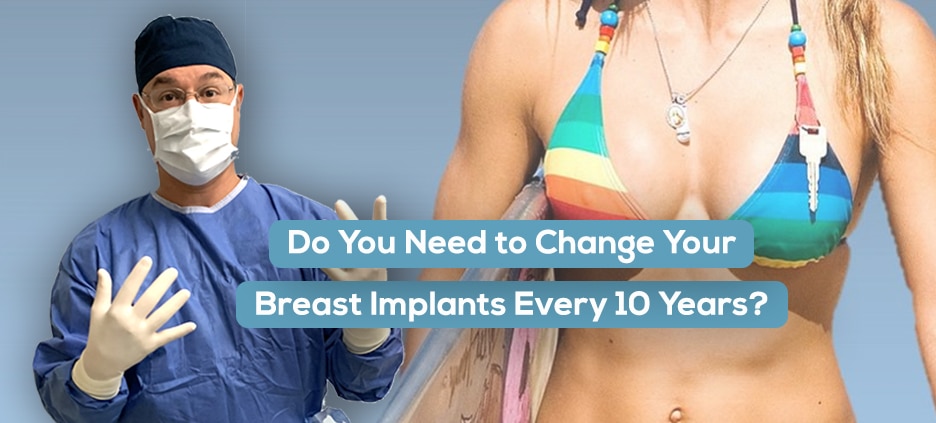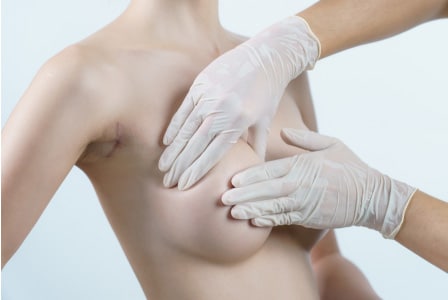Breast augmentation with implants is among the most popular cosmetic surgery procedure performed worldwide. Women want to know if they need to change their breast implants after 10 years.
This is a very common question asked by women who have silicone or saline implants, or women who are thinking about getting implants.
The quick answer is “No.” Implants are not car tires that have an “expiration date”. They are carefully studied medical devices that you can technically live with forever.
What Type of Issues Can I have with My Implants?
Like with anything, issues can occur. There is a small chance that your breast implant can rupture or leak. The shell of the implant may develop a small hole or tear over time. Also, some abnormal thickened scar tissue may develop around the implant, making the implant feel hard. This is called capsular contracture and can vary from very mild to more severe.
Mild capsular contracture can result in an implant that feels slightly “harder”. As the severity increases, the scar tissue can distort the shape of the implant, making is appear more oval than round. Severe capsular contracture can cause painful breasts.
Other issues with silicone or saline implants can occur, such as implant malposition or “shifting”. The implant may appear to shift upwards or even into sideways into the armpits. The may also be visible folding or rippling of the implant, or bottoming out where the implant seems to drop below the breast fold.
These would be reasons to change, or remove, your breastimplants. So, as you can see, there are certainly reasons why you may need to have another surgery on your breasts after breast augmentation surgery.
 Where Did The Change Your Breast Implants After 10 Years originate?
Where Did The Change Your Breast Implants After 10 Years originate?
Where did the “ten-year” thing come from and why does everyone focus on this time frame? “Ten-years” exists for a variety of reasons. The FDA studies that were done on breast implants were incredibly detailed and carefully followed women for 10 years. The studies found that although the rate of all breast augmentation complications was relatively low, the risk increases the further out you get from the date of surgery.
So that means that you are more likely to experience an implant-related complication at 10 years after your surgery then you would only 3 years after your surgery. This does not mean that you WILL experience a complication at 10 years. It just means that the longer you have your breast implants, the higher the likelihood. The vast majority of women, however, do not experience any problems at 10 years after surgery. I have met some women, including some of my own patients, who have had breast implants for 20 years and have absolutely no adverse issues.
What Do I Tell My Patients?
So what does this mean and what recommendations do I give to my patients who are thinking about getting breast augmentation with breast implants? I tell all my patients that breast implants are not considered a “lifetime” device. In fact, the FDA specifically says that breast implants should not be considered a lifetime device.
If you have breast implants placed when you are young, there is a very high likelihood that you will have another surgery (or surgeries) on your breasts in your lifetime. However, it will usually be because you “want” another surgery, not because you “need” another surgery.
Why Would You Want Another Breast Surgery?
There are several reasons why you may choose to have another breast implant surgery, even if you are not having any complications like rupture, rippling, malposition, or capsular contracture. Perhaps you decide that you want to replace breast implants size. Maybe you want them to be made a little larger or a little smaller. This would require that you schedule a surgery to exchange the implants.
Maybe your body changes as you age, or after childbirth, and your breasts change in size or shape.
It would not be uncommon to require a breast lift, or breast reduction, after aging, weight fluctuations, or pregnancies. This would require and additional breast surgery. You may also just want to “upgrade” your implants. Technology is always changing and improving, and implants improve.
The implants we have today are significantly better than the implants we offered just a few years ago. It is also true that the implants we will offer in the future will be even better in terms of safety, comfort, and appearance. In this case, you may want to “upgrade” in the future to an improved implant.
Why Would I Want to Upgrade My Implants in the Future?
There are many women coming in today to have their older implants changed to current implants that are more advanced. For example, 10 years ago, most women were getting breast augmentation surgery with saline, or salt water, filled implants. These implants are satisfactory and have been placed in millions of women. However, they have a higher rate of visible rippling and also tend to look and feel a little more “fake” than silicone alternatives.
The data also shows that these implants have a higher rate of rupture, or leaking, than current silicone breast implants. Many women who have saline implants, are electively asking to change to silicone implants now. Also, even women who received silicone implants years ago, are requesting that their implants are changed.
This is because the silicone implants of the past are very different than the silicone breast implants of today. Older silicone was a liquid consistency.
Today’s silicone is a cohesive gel, or a “gummy bear” consistency. The more cohesive silicone tends to look and feel more natural as compared to older, liquid silicone. New, cohesive silicone implants have a lower incidence of leaking, rupture, and capsular contracture.
What if I Am Not Willing to Have Another Surgery in The Future?
It is indisputable that if you are considering breast implant surgery, you should accept that at some point you may have more surgery and with breast surgery comes breast augmentation recovery. If you are 100% opposed to any future surgeries, then breast augmentation with implants is not the procedure for you, since additional procedures are likely.
It is possible that additional surgery will be needed because of an implant-related complication, but more likely it will because you desire a change or an upgrade.
The 10-year mark is a fabricated number, but it is a reasonable guide for you to be aware of. It serves as a good mental reminder that you may want to consider a change or upgrade. But, if you are happy with your size, and you are not experiencing any implant-related issues, you do not have to schedule a routine breast augmentation procedure after 10 years.
So, while you may find that you want to change your breast implants after 10 years, you are not required to.
Questions and Answers
 What happens after 10 years of breast implants?
What happens after 10 years of breast implants?
Implant rupture statistics represent collective data from large patient populations, not a fixed timeline for implant replacement. After 10 years, about 20% of augmentation patients may seek revision surgery, often unrelated to implant rupture.
Do breast implants sag after 10 years?
Although implants may experience a gradual loss of strength with time, there is no strict 10-year expiration rule. It’s important to note that breasts may naturally sag and thin out over time in many cases.
Do I need breast implants replaced after 10 years?
There’s a common misconception that replacing breast implants is required every 10 years.
However, breast implants typically last 10-15 years and only need replacement if issues like rupture or capsular contracture arise.
Book Your Breast Augmentation Consultation
When you’re ready to discuss your plastic surgery goals with Dr. Schulman and specifically discuss breast augmentation, feel free to give our New York City office a call at (212) 289-1851.
We’d be pleased to help you schedule an appointment and get you in for your initial consultation with Dr. Schulman.
References
https://www.plasticsurgery.org/news/blog/do-i-need-to-change-my-breast-implants-every-10-years



 Where Did The Change Your Breast Implants After 10 Years originate?
Where Did The Change Your Breast Implants After 10 Years originate? What happens after 10 years of breast implants?
What happens after 10 years of breast implants?
